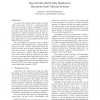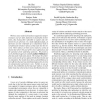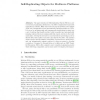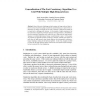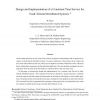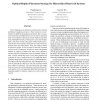111
click to vote
NSDI
2007
15 years 4 months ago
2007
Byzantine fault tolerant systems behave correctly when no more than f out of 3f + 1 replicas fail. When there are more than f failures, traditional BFT protocols make no guarantee...
115
click to vote
ICDE
1991
IEEE
15 years 6 months ago
1991
IEEE
Voting protocols ensure the consistency of replicated objects by requiring all read and write requests to collect an appropriate quorum of replicas. We propose to replace some of ...
139
Voted
ACSAC
2007
IEEE
15 years 6 months ago
2007
IEEE
Wireless sensor nodes lack hardware support for tamperresistance and are often deployed in unattended environments, thus leaving them vulnerable to capture and compromise by an ad...
124
click to vote
ECOOP
2010
Springer
15 years 7 months ago
2010
Springer
The paper introduces Self-Replicating Objects (SROs), a new nt programming abstraction. An SRO is implemented and used much like an ordinary .NET object and can expose arbitrary us...
106
click to vote
ICCS
2003
Springer
15 years 7 months ago
2003
Springer
Abstract. One of the main challenges of grid systems of large scale and data intensive is that of providing high availability and performance, in spite of the unreliability and del...
116
click to vote
DSN
2003
IEEE
15 years 7 months ago
2003
IEEE
Clock-related operations are one of the many sources of replica non-determinism and of replica inconsistency in fault-tolerant distributed systems. In passive replication, if the ...
ISPAN
2005
IEEE
15 years 8 months ago
2005
IEEE
We propose an architecture for self-adjusting and self-healing atomic memory in highly dynamic systems exploiting peer-to-peer (p2p) techniques. Our approach, named SAM, brings to...
139
click to vote
CCGRID
2006
IEEE
15 years 8 months ago
2006
IEEE
Grid computing is an important mechanism for utilizing distributed computing resources. These resources are distributed in different geographical locations, but are organized to p...
130
click to vote
HPCC
2007
Springer
15 years 8 months ago
2007
Springer
In a data-indexed DHT overlay network, published data annotations form distributed databases. Queries are distributed to these databases in a nonuniform way. Constructing content d...
123
Voted
ICDE
2007
IEEE
15 years 8 months ago
2007
IEEE
We present a replication-based approach that enables both fast and reliable stream processing over wide area networks. Our approach replicates stream processing operators in a man...
